Career Psychology is copyright © Dan Joseph Cavicchio. All rights reserved. No part of this book may be republished, reproduced, or transmitted in any form without the prior written permission of the author. The material in this book is provided solely for informational and educational purposes. It does not substitute for professional counseling or therapy. Information in this book does not represent clinical advice for treatment of psychological disorders.
Chapter Fourteen
Action Steps
 In this chapter, I will share a variety of tools that can help to convert the ideas in this book into action.
In this chapter, I will share a variety of tools that can help to convert the ideas in this book into action.
To begin, let me share some "stretch steps" for each facet of the career development process. As a behavioral therapist, I encourage my counseling clients to stretch their behaviors in gentle ways each day. A series of small stretches can lead surprisingly quickly to new experiences.
Along those lines, I encourage you to read through the following action steps and note which ones trigger a sense of resistance in your mind. Those might turn out to be the most powerful ones to work on in the end.
Also notice which of these steps feel easiest to practice. Those might be the best ones to start with. We always want to get a momentum going. Beginning with the easiest steps while working toward more resistant areas is usually a good strategy.
Exploring Career Paths
Stretch to consider career paths that might be outside your immediate area of expertise.
Career exploration involves opening the mind. In order to feel the "pull" — the inner sense of what draws your interest — it can be helpful to clear the mind of limiting preconceived notions.
When considering a career path, your mind might tell you that you're too young, too old, too technical, too creative, too introverted, too extroverted, or something else. Try to release those thoughts. Consider career paths as broadly as possible, without self-limiting beliefs. Stretch to open your mind as wide as possible as you're considering various career options.
Stretch to chat with people about their work experience.
There is no substitute for direct conversations with people about their work. Would you like to know what it's like to be a barista in a coffee shop? Many baristas would be happy to share their experience with you. How about a postal worker, or a firefighter, or a marriage license clerk? People who are working in those roles can give you an inside look at their work lives.
You may be thinking, "I don't want to bother anyone." But many people will be honored that you're interested in their work experience. Some may even be excited to "recruit" you into their field. Try to stretch by initiating conversations with people in fields that you find interesting. You can do this in person, by email, or by sending folks a LinkedIn or Facebook message.
Job Searching
Stretch to look for job postings that are in unusual places.
Most of my career counseling clients settle into a habit of checking a handful of job posting websites over and over. I always encourage them to stretch by finding, bookmarking, and regularly checking sites outside their typical pattern.
There are hundreds of niche job posting sites in specialty fields and regions. There are also many government job posting sites on the city, county, state, and federal level. Generally, none of these sites will have any overlap with the others. Stretch to find and check these specialty sites. You may be one of only a few candidates who see the jobs posted there.
Stretch to consider posting your resume, if it's safe for you to do so.
Let me once again underscore that it can be a risk to post your resume. Your employer (or a recruiter who works with your employer) may see your resume and assume that you're preparing to quit your job. Please only post your resume if you are truly comfortable doing so, and confident that it will not put you at risk.
If that is the case, doing so can be very productive. You can use a dedicated Gmail and Google Voice number on your resume to screen contacts accordingly. You can include a comment about your target relocation areas, job type, or other parameters. You can also tag "open to work" on your LinkedIn profile. If it's safe for you to do so, this can be a great stretch step to find new opportunities.
Stretch to have conversations with people about the gifts and skills you are excited to offer.
As I mentioned earlier, up to 80% of jobs are found through conversations and interpersonal connections. It may feel a bit vulnerable or exposing to let people know that you're interested in new opportunities. However, that type of stretch can produce significant results.
If the traditional "networking" approach doesn't appeal to you, you can flip the script and simply focus on giving. You can let people know how eager you are to help, and share ideas about how you would like to use your gifts. In this way, networking becomes an offer of help rather than a request for job leads. That shift can change the emotional impact of the experience.
Applying for Jobs
Stretch to apply for jobs that are "in the ballpark," even if you're not sure that they're a fit.
I spend a great deal of time encouraging my counseling clients to consider job opportunities that seem like imperfect fits. I tell them, "We really don't know what this job will be like. You might have a great connection with the people there, or you might not. The job responsibilities might be flexible, or they might not. There's no way to tell that from a job ad."
I then encourage them to apply for openings that are "in the ballpark" as an exploration process. I encourage you to stretch your scope as well. Once you actually talk to a recruiter or hiring manager at a company, you can describe your goals, skills, values, and interests. At that point, it will become clearer if there is a good match from both sides. If you stretch to apply for "imperfect" jobs, it can help to start these conversations.
Stretch to tailor your resume and cover letter to match the position.
I have read stories of people who applied for over 1000 jobs without receiving any response. If those stories are accurate, I imagine that the applicant is blasting out a non-customized resume without a cover letter. A far better approach is to slightly customize your resume and cover letter to highlight the matches between your background and the job at hand.
I encourage you to stretch by spending at least five minutes to edit the summary section on your resume, re-order your bullets, and customize a brief cover letter to show the matches. When you do this, you make it almost impossible for recruiters to put you in a "not a fit" category. A stretch to customize can help enormously to open doors.
Interviewing
Stretch to find connections with your interviewer.
Everyone wants to feel that they are in the company of a friend. You can help to create this sense of kinship by finding connections with your interviewer, and referencing those in your conversations.
Perhaps your interviewer used to live in the same part of the country that you did. Perhaps you both have an interest in a sport. Perhaps you and she are both connected to a common person on LinkedIn. By doing a little research, you may be able to find those connections. If there are no apparent commonalities up front, you can look for them throughout your conversation. Stretch to seek those connections, point them out, and foster a sense of kinship.
Stretch to highlight how you can help.
It's very likely that your mind will tell you that you need to impress people during the interview process — that you need to get their approval and get the job. I encourage you to stretch by moving in the opposite direction. Instead of trying to get approval, you can focus instead on all that you have to give.
Express your enthusiasm to give and help. Share stories about how you have given and helped in past jobs. Mention ways that you are excited to support the organization and its people. As you do that, it's very likely that your interviewer will "reflexively empathize" with your enthusiastic, giving-oriented mindset, and feel delighted about the potential to work together. By focusing on giving, rather than getting, you will very likely make the best impression possible.
Stretch to learn details about the company
A large number of the people I interview as a recruiter know very little about the company they are applying to work with. Some candidates haven't even taken time to read through the company's website when they interview with me.
If you stretch to learn about the company you're interviewing with, it can only help. Read through their website, including any news items or press releases. Look them up on LinkedIn and see how many employees they have. Learn about their history. And then reference this information in the interview. You will stand out far more than other candidates who didn't take the time to do that.
Self-Employment
Stretch to learn about the needs of people and companies.
Many entrepreneurs start a business by offering services or products that they are personally excited about. If it turns out that there is a need for that offering, the business booms. If not, the business struggles to build a customer base.
Instead of taking an "if you build it, they will come" approach, I encourage you to stretch by first learning about what the people and organizations around you need. Then ask yourself what exciting products and services can fill those needs. It takes a bit of work up front to learn about people's needs and desires. But the more you understand the mindset of your potential customers, the more likely you'll be to offer something truly helpful.
Stretch to broaden your business mix at the beginning.
Recall the three-dimensional cube model. Most people settle on a single point in the cube. However, especially at the beginning stages of a business, it may be helpful to expand the scope of your offerings.
If you're planning to offer a service, consider adding a product as well. If you're considering a tangible product, consider a digital or ideas-oriented one as a compliment. If you're planning to run your business by yourself, consider including a consultant or contractor in the mix to help you out. Stretch to expand your conception of your business structure and offerings. Once you find your niche, you can narrow to what works. But at the outset, it can be helpful to cast a wide net.
Stretch to find referral sources.
It's essential to get the word out about the products and services you're offering. You can do that by outreach to potential customers. However, you can also reach out to people who interact with your potential customers. Stretch to identify, locate, and build relationships with these people.
In my psychotherapy practice, I've received referrals from nurse practitioners, therapists, professors, and parole officers. These people all interacted with large numbers of people who were seeking counseling. I've also served as a referral source for many of these people myself. Think about who might interact with potential customers of yours, and stretch to develop those relationships.
Improving your Work Life
Stretch to use the five techniques I outlined.
Many people read through tools like the ones I outlined, but don't actually apply them on a day-to-day basis. I encourage you to stretch to make these daily habits. To briefly summarize the five approaches one last time:
Set a top goal of doing your work in a way that is enjoyable and emotionally healthy. Move any other goals after this one.
Seek for, propose, and solicit win-win solutions throughout your work day. A win-win solution is one that both you and other people feel good about.
Recognize what is within your power, and what isn't, and adjust your "locus of control" accordingly. Do not take over responsibility for things that are outside your control. Do proactively apply your creative efforts and skills to improve what is within your control.
Stop for a few seconds every hour to let your stress circuits relax. Set an hourly alarm on your phone or computer if you find it helpful. During these times, let your mind relax. Don't give in to the belief that you have to endlessly "push through" things without a break.
Set a higher purpose for your work, in addition to making money. You get to choose this, and your choice of purpose will shape your entire experience of your work. It will give meaning to what you do. A shift in purpose can alter the entire landscape of your career.
Worksheets
Let me now offer copies of some worksheets that can help you apply the ideas in this book. I encourage you to actually fill out these worksheets, as a way of clarifying your thoughts.
You can view and download PDF versions of these worksheets by using the following links.
Worksheet: Career Exploration: The Five Questions
These five questions can help to clarify some areas to explore further. It may be helpful to clear the mind of any preconceived notions or ideas as you consider these.
Click for a PDF version of this worksheet.
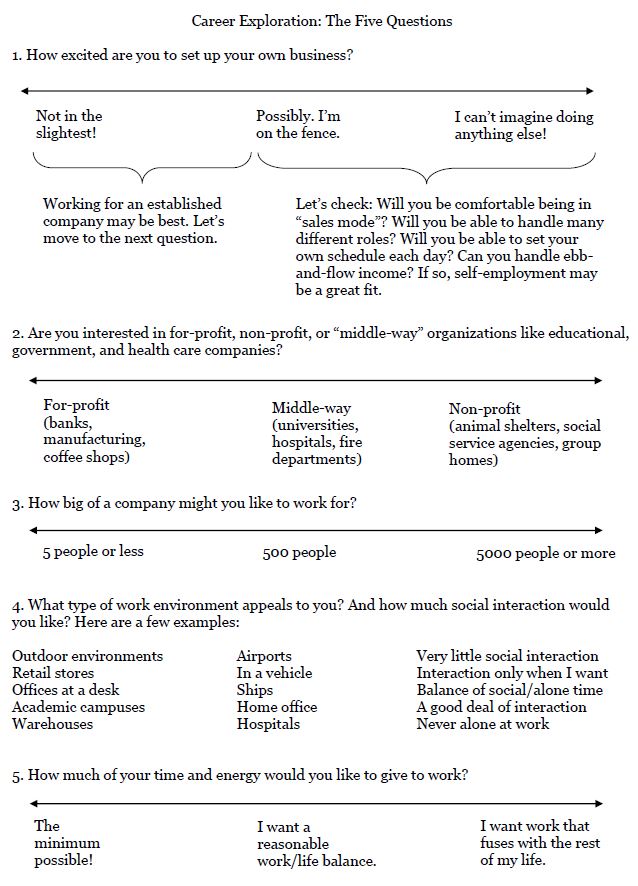
Worksheet: Daily Practice Record
You can use this practice record to keep track of progress on any new behavioral habit, including your job search. Remember that 5 to 15 minutes a day will likely produce excellent forward momentum.
Click for a PDF version of this worksheet.
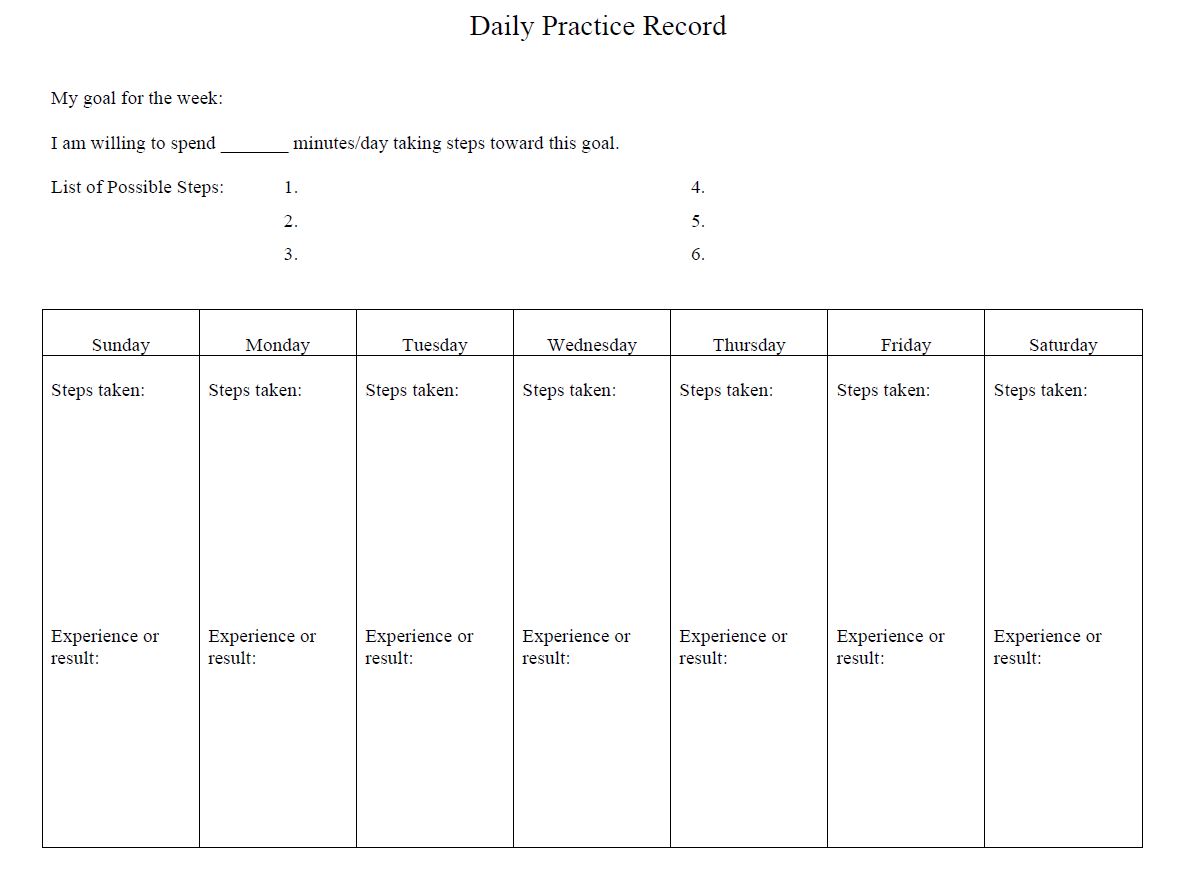
Template: Simple Resume
You can keep your resume simple. Feel free to model it after this basic format. Remember that the matches between your background and the job you're applying for are important to highlight. Your summary and first few bullets should show those.
Click for a PDF version of this worksheet.
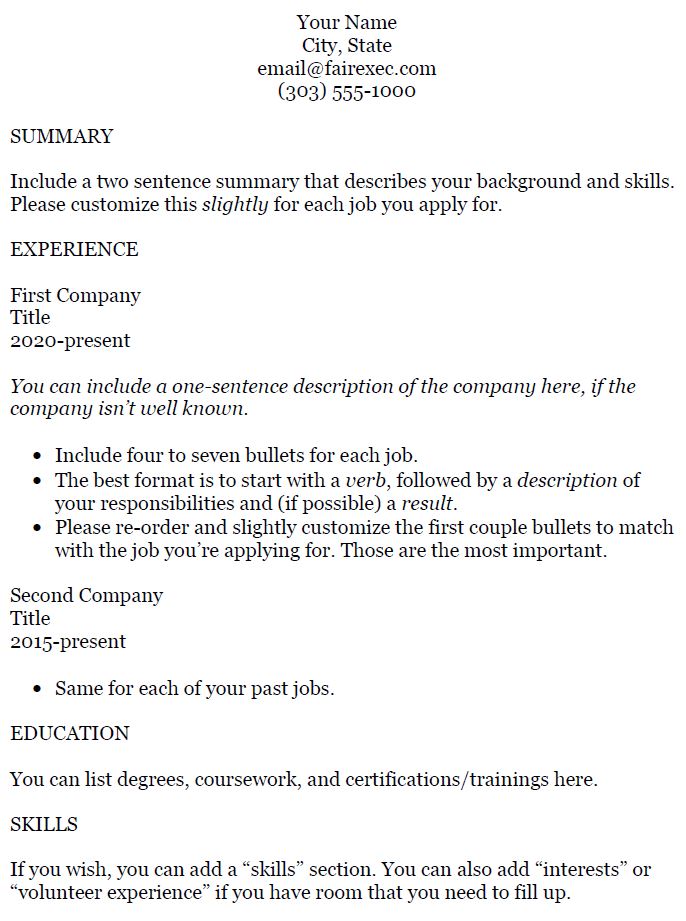
Template: Simple Cover Letter
I recommend a simple, three-paragraph cover letter. The first paragraph introduces you and states the position you're applying for. The second paragraph points out a few matches between your background and the job. The third paragraph is a wrap-up.
Certainly feel free to modify this as you wish, but try to keep things as concise as you can. Remember that you may have less than thirty seconds (and perhaps as few as six seconds) to hold your reader's attention.
Click for a PDF version of this worksheet.
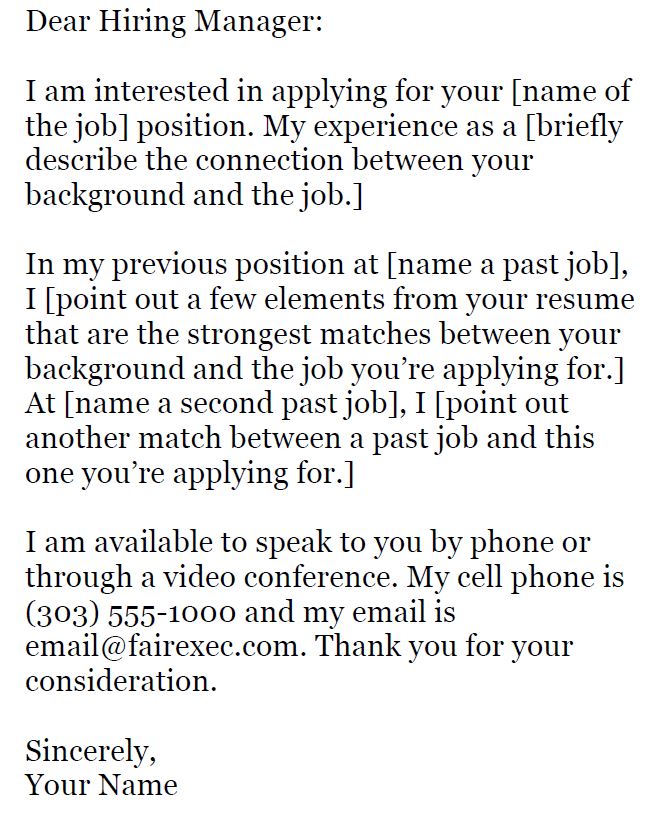
Worksheet: Interview Questions
It's best to prepare answers to these questions for each company you interview with. Questions 2 through 4 may stay the same, but Question 1 should be customized for each position. Remember that stories are powerful ways to communicate.
Click for a PDF version of this worksheet.
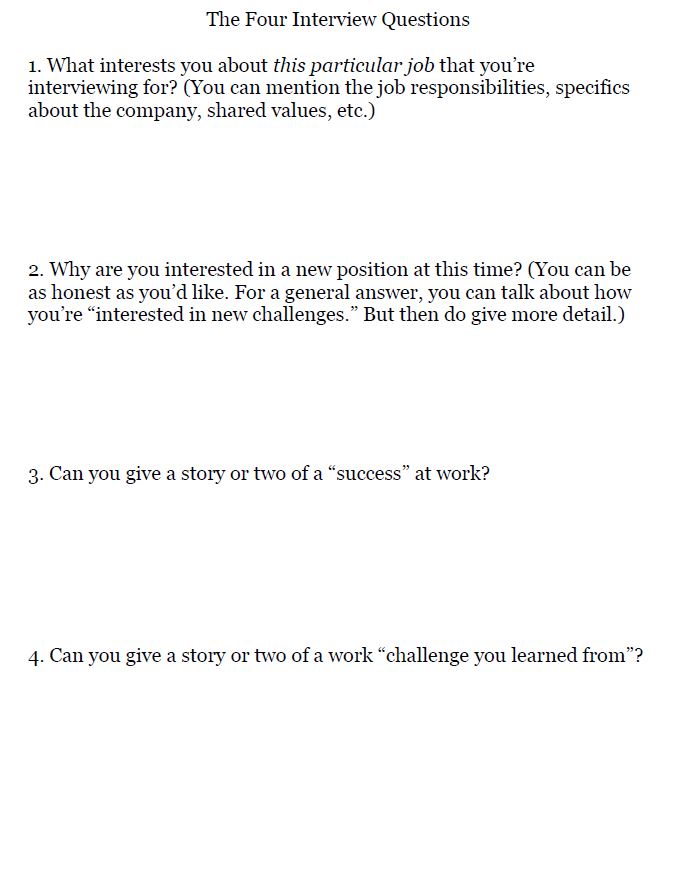
Career Lists
Let me share a series of career and job lists organized by topic. These lists are not exhaustive. They are simply designed to spark your creative circuits and lead to further exploration.
I also encourage you to explore the O*NET OnLine site at www.onetonline.org which contains customized lists based on your O*NET Interest Profiler results. There are thousands of jobs on the O*NET site, organized by categories.
As you read through these lists, try to get a sense of where your "inner compass" might be pulling you. Note when you feel an emotional spark. When that happens, you might want to explore that type of job — and related ones — more fully.
Careers for people who like to be outdoors
|
Landscaper |
Parks and rec worker |
|
Farmer |
Roofer |
|
Forest service worker |
Exterior painter |
|
Road maintenance worker |
Stone mason |
|
Surveyor |
Wilderness guide |
|
Ski instructor |
Arborist |
|
Environmental technician |
Oil and gas field worker |
|
Electrical utility worker |
Logger |
|
Solar panel installer |
Dog walker |
|
Geologist |
Wildlife control officer |
Careers in skilled trades
(many of which have apprenticeship programs)
|
Carpenter |
Electrician |
|
Plumber |
Pipe/steam fitter |
|
Stone/brick mason |
Cement/concrete mason |
|
HVAC |
Ironworker |
|
Boilermaker |
Drywall installer |
|
Glazier/glass worker |
Tile setter |
|
Sheet metal worker |
Roofer |
|
Fire sprinkler fitter |
Fence construction |
|
Flooring specialist |
Solar energy installer |
|
Welder |
Mechanic |
Careers for people who like numbers
|
Engineer |
Financial analyst |
|
Statistician |
Math teacher/professor |
|
Accountant |
Actuary |
|
Physical scientist |
Data scientist |
|
Supply chain analyst |
Computer systems modeler |
|
Banker |
Systems analyst |
|
Cryptographer |
Database administrator |
|
Insurance adjuster |
Loan officer |
|
HR compensation analyst |
Financial securities trader |
|
Auditor |
Estimator |
Careers for people who like words
|
Advertising copywriter |
Translator |
|
Copy editor |
Teacher |
|
Executive editor |
Sales professional |
|
Journalist |
Librarian |
|
Technical writer |
Social media manager |
|
Counselor |
Corporate trainer |
|
Marketing communications |
Transcriber |
|
Public policy professional |
Attorney |
|
eLearning content creator |
Paralegal |
|
Public relations specialist |
Religious professional |
Careers for people who are visually-oriented
|
Photo editor |
Architect |
|
Painter |
Interior designer |
|
Fashion designer |
Marketing communications |
|
Advertising executive |
Product designer |
|
Brand manager |
Videographer/video editor |
|
Art director |
Graphic designer |
|
Layout designer |
Photographers |
|
Illustrators |
User experience designer |
|
Art teacher |
Video game designer |
|
Filmmaker |
Fine artist |
Careers for people who like movement
|
Postal mail carriers |
Retail store workers |
|
Personal trainer |
Yoga instructor |
|
Building inspector |
Property manager |
|
Massage therapist |
Mechanic |
|
Pre-school teacher |
Restaurant server |
|
Construction worker |
Groundskeeper |
|
Plumber |
Carpenter |
|
Police officer |
Firefighter |
|
Physical therapist |
Many military roles |
|
Housekeeper |
Repair professionals |
Careers that focus on helping vulnerable people
|
Nurse |
Firefighter |
|
Teacher |
Psychologist |
|
School counselor |
Physician/physician assistant |
|
Case manager |
Medical assistant |
|
Marriage and family therapist |
Mental health counselor |
|
Non-profit professional |
Public defender |
|
District attorney |
Police officers |
|
Addictions counselor |
Social worker |
|
Child protective services worker |
Physical or occupational therapist |
|
Paramedic |
Nursing home staff |
Careers for people who like to be around food
|
Chef/cook |
Food production worker |
|
Caterer |
Bartender |
|
Restaurant server |
Cafeteria worker |
|
Line/prep cook |
Restaurant host/hostess |
|
Food delivery driver |
Restaurant manager |
|
Agricultural worker |
Grocery store staff |
|
Food inspector |
Barista |
|
Specialty foods marketer |
Food distribution worker |
|
Restaurant busser |
Food scientist |
|
Pastry chef |
Dietitian |
Careers that can be done remotely or virtually
|
Virtual admin assistant |
Website creator |
|
Writer |
Graphic designer |
|
Customer service rep |
Account manager |
|
IT professional |
Editor |
|
Proofreader |
Medical transcriber |
|
Software programmer |
Online tutor/teacher |
|
Internet-based researcher |
Software tester/QA |
|
Life coach |
Data scientist/analyst |
|
Customer service rep |
Technical support |
|
Appointment setter (sales) |
Marketing consultant |
Careers that involve travel or transportation
|
Delivery driver |
Travel agent |
|
Cargo ship crew |
Flight attendant |
|
Long-haul truck driver |
Pilot |
|
Rail yard worker |
Tourism sales rep |
|
Rideshare driver |
Highway maintenance worker |
|
Cruise ship staff |
Dock worker |
|
Tour guide |
Bus driver |
|
Distribution analyst |
Airline ticketing agent |
|
Rental car agency staff |
Air traffic controller |
|
Train engineer |
Airport concessions worker |
Careers for people who are introverted
|
Forestry worker |
Technical writer |
|
Laboratory technician |
Video editor |
|
Software Test/QA |
Visual artist |
|
Business analyst |
Engineer |
|
Graphic designer |
Assembler/production worker |
|
Mechanic |
Accountant |
|
Website coder |
Truck driver |
|
Repair technician |
Researcher |
|
Farmer |
Medical coder |
|
Tree/lawn care worker |
Database analyst |
Careers for people who are extroverted
|
Sales/account rep |
Nurse |
|
Corporate trainer |
HR generalist |
|
Attorney |
Marketing specialist |
|
Event planner |
Teacher |
|
Recruiter |
Office manager |
|
Customer service rep |
Social media manager |
|
Physical therapist |
Team manager |
|
Realtor |
Social worker |
|
Store manager |
Bank teller |
|
Restaurant server |
Reporter |
Let me share a caveat on these lists: I can think of numerous people in these careers who don't "fit" the heading. For example, I myself am very introverted by nature — but I work in typically "extroverted careers" as a recruiter and counselor.
You can explore any career that you'd like, no matter how it's classified or described. Your inner compass — your inner sense of what interests you — will guide you in its own unique way.
Finally, let me share a list of thirty small business ideas that don't require special degrees or a great deal of investment capital.
If you want to pursue the path of self-employment, see if any of these draw you. (But remember that it's always best to start by investigating the needs of people and companies around you.)
Small Businesses to Consider
|
House painting |
Business lead generation |
|
Personal training |
Written content creation |
|
Academic tutoring |
Website design |
|
Marketing consulting |
Handyperson/home repair |
|
Landscaping/lawn care |
Professional organizing |
|
Moving/transportation |
Videography |
|
Sewing/alterations |
Interior decorating |
|
Home inspection |
Graphic design |
|
Pet walking/sitting |
Internet-based reseller |
|
Life coaching |
Car detailing |
|
House cleaning |
Internet marketing/SEO |
|
Personal/virtual assistance |
Event planning |
|
Computer/IT consulting |
Catering |
|
Athletics coach/instructor |
Property management |
|
Child care |
Bookkeeping |
•
Links for Job Openings
Although there are new job posting websites that pop up frequently, the following are some that you may want to explore.
The Big Five:
Indeed: www.indeed.com
LinkedIn: www.linkedin.com/jobs
Monster: www.monster.com
Glassdoor: www.glassdoor.com
ZipRecruiter: www.ziprecruiter.com
Another Five:
Craigslist (small companies): www.craigslist.org
SimplyHired (aggregator): www.simplyhired.com
CareerBuilder: www.careerbuilder.com
Dice (technical jobs): www.dice.com
Upwork (freelance jobs): www.upwork.com
Specialty Sites:
There are hundreds of specialty job posting sites, including those for veterans, skilled trades, nursing, philanthropy, higher education, countless technical disciplines, and more. If you belong to a professional association or society, trade union, or other industry group, that type of organization can be a great place to start looking for these specialty sites. Otherwise, a simple internet search for "[your field] job site" may point you to some.
Workforce Centers:
Each state offers a "job bank" of local job listings at state-run workforce centers. (Your state may use a different term like "job center" or "career center.")
In addition to job listings, workforce centers often offer free career counseling, resume writing assistance, and other forms of career support. Please consider using these services. Your taxes have already paid for them!
To find your local workforce center, try searching on "[your county] workforce center" or visit your state's Department of Labor website.
Alternatively, you can go to www.careeronestop.org and click on the "find local help" menu to search by zip code. Note that this site calls workforce centers "American Job Centers."
Federal Government jobs:
Most federal-level government positions are located at the website www.USAJobs.gov. However, there are some federal agencies that aren't required to use the site — so you may also want to visit the careers page at any specific agency you're interested in (CDC, EPA, USPS, etc.)
State Government jobs:
Each state has its own site for jobs with the state government. Please note that these sites are not the same as the workforce centers, listed above. To find state government jobs, you can search on "[your state] government jobs."
County and City Government jobs:
You'll need to search on individual cities and counties for a list of jobs at the local government level. Note that there are unusual government structures in some states. For example, Alaska, Connecticut, and Rhode Island don't have county governments. You'll have to check at the city or state level there.
As I mentioned, the more "hidden" your local city and county government job sites are, the less competition you'll have. You can search on "government jobs in [city/county of ____]."
Companies:
Individual company websites may list hundreds (or even thousands) of job openings. Many of these won't be posted elsewhere. Please make sure to visit any companies and organizations that you like. These can include for-profit companies, non-profits, and middle-way organizations like universities, schools, and hospitals.
•
Final Note
As a final note, I want to acknowledge that it can be challenging to develop a fulfilling career. Many of us struggle to attend to the demands of our day-to-day lives. The idea of looking for a new career or job on top of that seems daunting.
And yet — I have known many people who were able to move from unfulfilling, emotionally draining work situations into new employment that felt remarkably right. I have known other people who were able to make positive changes at their current jobs, and found a greater sense of happiness (and often a raise). Improvements can happen.
I am a great believer that your "inner compass" — your inner sense of what is right for you — will guide you along your career path. Your inner wisdom will prompt you when it's time to make a change, and it will nudge you toward new areas to explore. Keeping an open mind helps this wisdom to arise.
Finally, you don't need to take your career journey alone. Even if you can't afford sessions with a professional career counselor, there are many affordable resources to draw upon. Your state-run "workforce centers" (also known as "American Job Centers") will likely offer free career support services, including resume writing and job search assistance. Your high school or college may also offer career services, even if you've already graduated.
In addition, most counseling and psychology graduate schools offer low-cost counseling to the community so that their graduate students can gain experience. Even new counselors and therapists who don't specialize in career issues will be happy to discuss your work life with you. They may be surprisingly helpful.
If you have questions about anything you have read in this book, you are welcome to email me. I will need to be brief in my replies, but I'm happy to clarify anything that is unclear. The best way to reach me is through my contact page.
I wish you the best in your career journey.